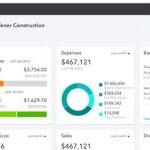A List of the Types of Accounting Software
Importance of Accounting Software
When you make a company, you must do accounting at some point or another. You might have been avoiding to tackle on the numbers or you don’t know how to use Excel sheets. But let me tell you, that numbers need not scare you. You can be good at numbers and learn how to read, make, and understand financial statements.
In making financial statements, you can use accounting software that fits your needs and are available at your disposal.
In starting a business, you’ll need to consider sales, capital, and expenses in the daily operations. As sales flow to your company, you need to record transactions, such as account receivables and account payables, in the ledger.
[toc] As a startup, you’ll be busy hiring, finding a good office, legal paper works, establishing the business, and sales records. The last thing on your mind is to pore over the mountain of receipts, invoices, bills and expenses at your desk. But you need worry no more as there are available accounting software that can handle this for you.At the end of each month and end of the annual fiscal year, you need to do close entry. After that, creating and submitting the Balance sheet, and Profit and Loss Statement.
In a day, there could be hundreds of transactions taking place, you have several options such as Excel, but the fastest and most efficient way to handle accounting is to use accounting software.
You can also choose to outsource the tasks of bookkeeping to accounting firms. It’s a good option to task accounting firms, but there are limitations because there are things in the company that only the business owners or office accountants can grasp and understand. It’s also important as a business owner that you know how to read and make financial statements so that you know the financial status and condition of your business.
Benefits of Accounting Software
For startups with limited manpower and financial resources, you might need to be the bookkeeper or do bookkeeping. It’s advisable to make use of bookkeeping software in order to record transactions and automate accounts receivable processes.
Through accounting, you can grasp cash flow on a real-time basis. To make bookkeeping effective and efficient, you should be familiar with the various accounting software that you can choose to use in your business. Thus, here in this article, we will outline the best accounting software for startups.
4 Benefits of Accounting Software
- Benefits of having an Accounting Software
- It automatically calculates journal entries for the Balance Sheet and Profit and Loss Statement.
- You can easily transfer the data to your Accountants and Auditor.
- Bookkeeping software has embedded useful tools and functionalities to analyze your business and perform financial analysis. It can also give suggestions as to the financial performance of your business.
- Your journal entries, drafts, invoices, and financial statements can be automatically printed in good and professional format for your accountants to use or for auditors to read.
How to choose the best accounting software
There are various accounting software that you can use for your accounting needs.
3 Major Types of Accounting Software
- 3 Major Types of Accounting Software
- Database Accounting Software
- Installed Accounting Software
- Cloud Accounting Software
1. Database Accounting Software
This type of system is used by multi-million dollar companies large corporations. Data is more secured since businesses need to have a large database to install this type of software. Oracle accounting software falls in this category. One needs to hire systems engineer and systems consultant to install and get this type of software operating in your company. Basically, this type of software can handle financial management, more complex tasks, large network and complicated accounting functions.
Target: Big companies, Banks, Large Corporations
Advantages: Flexibility, Security, Ability to handle complex accounting tasks
Disadvantages: Expensive, High Costs for Maintenance
2. Installed Accounting Software
In areas where internet connection is slow and limited, businesses can take advantage of accounting software in the form of CDs or DVDs which you need to install in your desktops or laptops.
Target: Startups, Small to Medium-sized Enterprises (SMEs)
Advantages: Easy-to-install, various accountants can use it
Disadvantages: Difficult to customize, difficult to use in multiple locations, limitation to the number of PCs that can use the software due to restrictions by the manufacturer, data is available on your computer or laptop only and it is not available online and cannot be shared to others
3. Cloud Accounting software
These accounting software are available online and data can be accessed through the Internet or Cloud. Examples of cloud-type accounting software are Freshbooks, Quickbooks, Sage 50 Premium Accounting 2015, and Xero.
Target: SMEs
Advantages: Less expensive, your data is available online and can be accessed anytime and anywhere, you can connect it with your online bank account
Disadvantages: Needs familiarization in terms of functionalities
Nowadays, cloud-based accounting services got more popularity for startups and small-sized businesses.
For startups, Freshbooks is also a good choice. Freshbooks comes with a 30- day free trial for those businesses who want to try it out first. This cloud-based accounting software lets you easily make and send receipts and bills to customers. It can also organize and manage your expenses while you are doing something more important. One nice feature of Freshbooks is that you can export the numbers to Quickbooks.
Also, one of the best and known accounting software is Quickbooks. For small businesses, Quickbooks makes accounting easy, simple, and manageable.
Xero is also one of the good online accounting software for small and medium-sized businesses. One of the best features of Xero is its functionality for teamwork and collaboration in making financial statements.
On the other hand, Sage 50 Premium Accounting 2015 Edition, formerly Peachtree, is the upgraded version of Peachtree and is stacked with powerful functionalities for your accounting needs. With Sage 50 Premium accounting software, you can do inventory, make financial statements and reports, sales orders and purchase orders, and a lot more.
Lastly, choose the accounting software that fits your business needs. Research, study and try out the accounting software mentioned above. Accounting software are valuable in the survivability and effectiveness of your business. It can make those numbers more manageable and easier to comprehend. By making use of accounting software, you can simply make a more professional and comprehensive financial statement that is indispensable in any business.












